Skin Cancer
Skin Cancer: Types, Causes, and Expert Care in the Lake Norman Area
Skin cancer is the abnormal growth of skin cells, predominantly caused by exposure to ultraviolet (UV) radiation from the sun or tanning beds. It is the most common type of cancer in the United States, with millions of new cases diagnosed each year. The three main types of skin cancer are basal cell carcinoma, squamous cell carcinoma, and melanoma. Each type varies in severity and requires different approaches for treatment.
Basal cell carcinoma and squamous cell carcinoma are the most common and are often linked to cumulative sun exposure. Melanoma, though less common, is more dangerous due to its ability to spread rapidly. Regular skin checks are vital for early detection and effective treatment of all skin cancer types.
Trusted Skin Cancer Specialists in the Lake Norman Area
Riva Dermatology offers comprehensive care for all types of skin cancer. Our experienced dermatologists use the latest technologies and techniques to diagnose and treat skin cancer effectively. Proudly serving Huntersville, Cornelius, Davidson, Mooresville, Denver, and surrounding communities.
Schedule your skin cancer screening today and ensure your peace of mind with expert care.
Examples of Skin Cancer
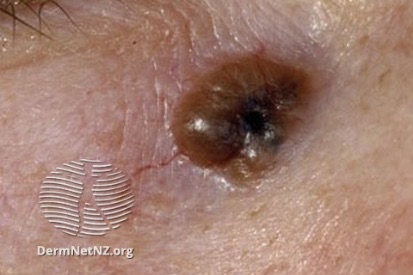

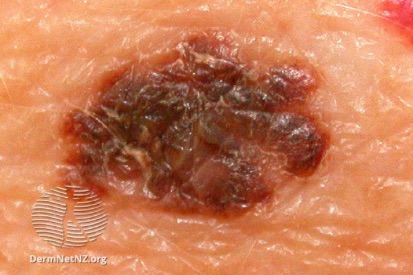
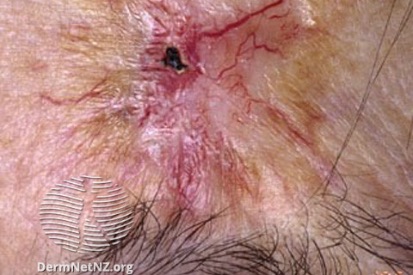
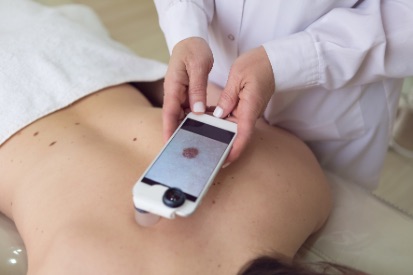
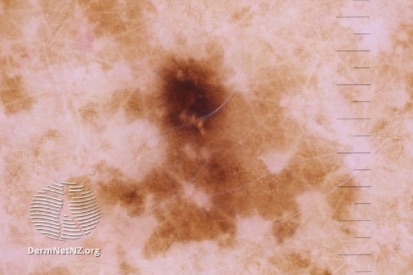
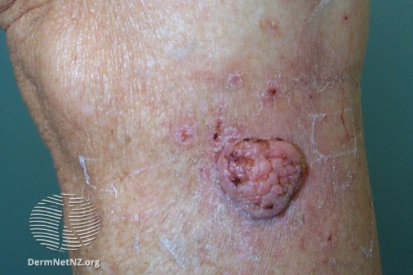

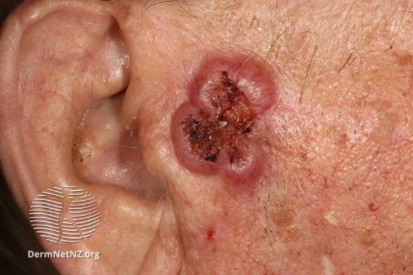
How to Spot Skin Cancer
Skin cancer can present in various ways, which is why it’s important to stay alert to any changes in your skin. Recognizing subtle or persistent skin changes early can significantly impact diagnosis and treatment outcomes for skin cancer. If you notice anything unusual, it’s best to consult a dermatologist at Pinnacle Dermatology for a professional evaluation.
Common skin cancer symptoms include:
- Changes in the size, shape, or color of existing moles
- New growths or spots that look different from other areas of your skin
- Sores or lesions that don’t heal, or heal and return
- Bumps that are pearly, waxy, or have a translucent appearance
- Rough, scaly patches or crusted areas on the skin
What Causes Skin Cancer?
As mentioned above, skin cancer often begins with damage to the DNA of skin cells, most commonly from ultraviolet radiation. Over time, this damage can lead to abnormal cell growth and cancer development.
At Pinnacle Dermatology, we understand the many factors contributing to skin cancer risk. We are committed to helping you identify and manage those risks through expert care, personalized prevention strategies, and routine skin exams.
Common skin cancer causes include:
- Excessive UV exposure from the sun or artificial sources like tanning beds
- Frequent sunburns, especially during childhood or adolescence
- Fair skin, light hair, and light-colored eyes (lower melanin levels mean less natural protection)
- A history of skin cancer or precancerous lesions
- Weakened immune system, due to illness or medications
- Exposure to toxic substances, such as arsenic
- Genetic factors or a family history of skin cancer
- Chronic skin inflammation or injuries in the same area over time
How to Prevent Skin Cancer
While skin cancer is one of the most common cancers, it’s also one of the most preventable. Every day presents an opportunity to protect your skin and reduce your risk through simple, consistent habits. From daily sun safety to staying aware of changes in your skin, skin cancer prevention starts with awareness—and ends with action.
At Pinnacle Dermatology, we empower our patients with the knowledge and care they need to take charge of their skin health. Through daily protection, self-checks, and annual total body skin exams, you can stay one step ahead and safeguard your health for the long term.
Daily Protection Habits
Daily protection starts with healthy skin habits. Use a broad-spectrum sunscreen with SPF 30 or higher every day, even on cloudy days, and reapply regularly. Wear protective clothing like wide-brimmed hats and long sleeves, and seek shade during peak sun hours (10 a.m. to 4 p.m.) to minimize UV exposure.
Importance of Regular Skin Self-Exams
Perform a monthly skin cancer self-exam to check for new moles or changes in existing spots. Use a mirror to examine all areas of your body, including hard-to-see places. If you notice anything suspicious, such as changes in shape, color, or size, schedule a visit with a dermatologist immediately.
Annual Total Body Skin Exams at Pinnacle Dermatology
An annual total body skin exam with a Pinnacle Dermatology provider offers a thorough, professional evaluation of your skin. During the exam, we check for any abnormal moles, lesions, or changes. Early detection dramatically improves treatment success, making these yearly exams vital to your skin health routine.
Skin Cancer FAQs
The main types are basal cell carcinoma, squamous cell carcinoma, and melanoma, each varying in severity and treatment options.
The primary cause is UV radiation exposure. Other factors include genetics, fair skin, and a history of sunburns.
Treatments depend on the type and stage but may include surgical removal, cryotherapy, radiation therapy, and topical medications.
Melanoma is more likely to spread (metastasize) than basal or squamous cell carcinoma, emphasizing the importance of early detection.
If you notice any unusual changes in your skin, contact a dermatologist immediately for a professional evaluation and potential biopsy.
With a team of highly skilled dermatologists and the latest technology, Riva Dermatology provides comprehensive and personalized skin cancer care to patients in the Lake Norman area.
From Our QualDerm Family of Providers: Skin Cancer Treatment Options
Skin Cancer Treatments
Receiving a skin cancer diagnosis can feel overwhelming, but treatment options today are highly effective, especially when the condition is caught early. At Pinnacle Dermatology, we provide personalized care plans tailored to your specific type, stage, and location of cancer. Whether your treatment involves non-surgical methods or advanced surgical techniques, our experienced providers are here to guide you every step of the way.
Non-Surgical Treatments
For certain types and early stages of skin cancer, non-surgical options can be effective. These may include topical medications, cryotherapy (freezing), or targeted therapies that destroy cancer cells without incisions. Your Pinnacle Dermatology provider will determine if a non-invasive approach is appropriate for your condition.
Surgical Treatments
Surgical treatments are often the most effective option for removing skin cancer, especially in more advanced or high-risk cases. Procedures may include excisional surgery or Mohs micrographic surgery, which precisely removes cancerous tissue while preserving healthy skin. Pinnacle Dermatology offers expert surgical care tailored to your needs and diagnosis.
Featured Products for Sun Protection
Check your local office for current stock!
Check your local office for current stock!


